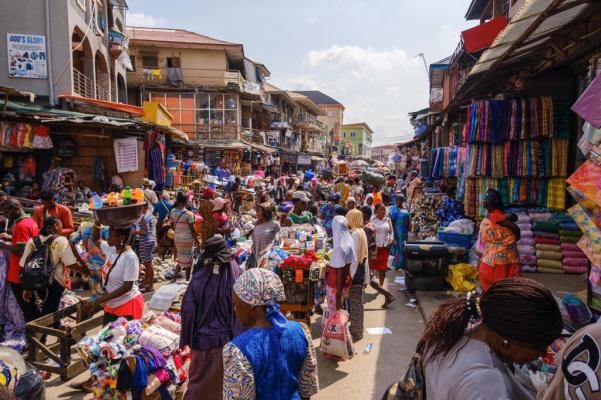Sabi, a Lagos-based B2B e-commerce startup providing digital commerce infrastructure to Africa’s informal economy, has raised $38 million in Series B funding at a valuation of $300 million, according to two people familiar with the matter, signaling revived investor interest in a B2B e-commerce market going through some reckoning.
Frankfurt-based specialist fintech investor CommerzVentures, Stockholm-based but Africa-focused growth-stage investor Norrsken22, U.S.-based growth-stage funds Fluent Ventures and Proof VC and pan-African early-stage investors CRE Venture Capital and Janngo Capital are some of the investors in this round, the people said.
Sabi declined to comment on the matter.
The informal trade sector makes up most of Africa’s $1 trillion retail market. The largely fragmented industry has welcomed innovation from several startups trying to connect informal retailers to manufacturers and large wholesalers via digital platforms like apps and a network of logistics and distribution services over the last couple of years.
For most of 2021 and early 2022, these B2B e-commerce startups enjoyed a fine run, raising millions of dollars from local and global investors, money most of them pushed to drive growth tactics such as providing incentives and discounts on various products to capture merchants early. However, such propositions are always a race to the bottom. With free money evaporating in light of rising global interest rates, some B2B e-commerce startups are reviewing growth strategies as they cut costs and retreat from specific markets.
Well, not Sabi. According to people with knowledge of the company’s dealings, the startup, with operations in Nigeria, Kenya and South Africa, is showing no signs of struggle, posting mind-boggling growth numbers for a startup that has just been in business for two-and-the-half years.
In late 2021, Sabi executives Anu Adasolum and Ademola Adesina told TechCrunch that it had over 175,000 merchants on its network while recording a $200 million annualized GMV run rate. Those numbers have increased multiple-folds to more than 300,000 merchants and over a $1 billion annualized GMV, three people familiar with the startup’s financials said.
In comparison, Wasoko, the most capitalized B2B e-commerce of the lot, which raised $125 million at a $625 million valuation last March and seems to be faring well despite industry-wide contractions, noted that it had 50,000 active merchants while processing over $300 million in GMV (it’s worth noting that Wasoko’s GMV numbers have increased since then; it has about 200,000 informal retailers following its expansion to Zambia).
One thing to point out is how Sabi’s operational model and the customers it targets allow it to rake in more merchandise numbers.
Wasoko, MaxAB, Alerzo and TradeDepot are full-scale asset-heavy platforms that own and lease facilities in their distribution chain from warehousing to logistics. Some marketplaces, such as Chari, Cartona and Omnibiz, employ asset-light models, using third-party warehousing and logistics, while marketplaces like MarketForce and JABU use hybrid models.
Asset-heavy or asset-light, these platforms talk with wholesalers, manufacturers and distributors (or become one themselves) but ultimately cater to the retailers or merchants as they are called. On the other hand, Sabi, with its asset-light model, complements the intermediaries in the B2B e-commerce retail chain, from manufacturers and distributors to wholesalers and retailers (who the startup collectively refers to as merchants). It uses offline agents, call centers, merchant partners and supplier centers (with access to tools including inventory management, sales, tracking, digital invoices and analytics) as channels to meet the various stakeholders in this value chain.
The company’s executives, in an email statement to TechCrunch, said Sabi’s growth model and its approach of “focusing on the fundamentals and ensuring sound unit economics and profitability before pursuing expansion” differentiates it from other startups in the sector and has allowed it to maintain a sustainable trajectory, even in challenging market conditions.
“Sabi’s ecosystem-based approach, where we treat manufacturers, distributors, wholesalers, and retailers as merchants, is designed to be highly adaptive and responsive to market dynamics. By creating value for various stakeholders and adjusting our approach based on new learnings, we can maintain long-term sustainability even amidst short-term explosive growth. This flexibility is crucial in the markets we operate in, where stakeholder roles can be fluid,” CEO Adasolum added when quizzed about the long-term sustainability of the startup’s model.
Sabi’s primary revenue sources remain the same: capturing a 5-6% take rate (depending on the category) from marketplace transactions and earning a financing margin on credit-related transactions it originates. The startup has facilitated over $100 million on behalf of local microfinance banks and fintech lenders, three people familiar with the company’s financials said, likely speaking to why fintech-focused CommerzVentures invested in the firm.
Meanwhile, according to the sources, Sabi is recording 15,000 monthly orders and experiencing over 20% month-on-month growth. That’s one-tenth of Wasoko’s monthly orders from last March; however, a higher GMV (if Wasoko’s isn’t up to $1 billion yet) could mean that Sabi records higher average order values mostly from wholesalers, not retailers. This is why the startup, having raised more than $60 million (including a previously unreported $15 million Series A last year), is launching new products and features to target its agents and last-mile merchants. Sabi might consider these additions as a means to accommodate extra revenue models and focus more on the B2B payments value chain.
The category-agnostic upstart, whose merchants deal with FMCG goods as well as products in agriculture, electronics and chemicals, is also planning to expand into other markets, including Tanzania and Malawi (via an acquisition), the Democratic Republic of Congo (DRC) and Francophone West Africa, according to two people familiar with the company’s plans.
